United States Expatriation at an All-Time High

Introduction
The Internal Revenue Service (IRS) of the United States releases quarterly reports tracking the number of expatriated citizens processed in the previous three-month period. The reports are announced via the Federal Register which is the primary publication medium of the federal government and used by a number of agencies as an outreach arm to the public.
Ostensibly, the tax bureau maintains these records instead of Citizenship and Immigration Services (CIS) because the IRS uses that information to adjudicate decisions regarding those expatriating citizens upon whom the Expatriation Tax is levied.
An expatriate must meet any one of the following criteria to be liable for the eponymous tax:
- Average annual net income tax for the five years ending before the date of expatriation or termination of residency is more than a specified amount that is adjusted for inflation ($151,000 for 2012, $155,000 for 2013, $157,000 for 2014, and $160,000 for 2015).
- Net worth is $2 million or more on the date of expatriation or termination of residency.
- Failure to certify on
Form 8854that the citizen has complied with all U.S. federal tax obligations for the five years preceding the date of expatriation or termination of residency.
IRS Form 8854 available at is a statement which confirms that up to the date of your expatriation, you have complied with United States Federal Tax Code to the letter of the law. Failing to correctly complete this document means that you are obligated to pay the Expatriation Tax, even if you do not meet either of the previous criteria.
Previous article tracking United States expatriation:
Data
The Federal Register is a publishing outlet for the United States Government where the IRS officially releases quarterly information about American citizens who renounce their passport in lieu of a new one and other long-term residents who have decided to repatriate, view the raw data here and use the Axibase Data Crawler designed specifically for collecting, parsing, organizing and inserting historical expatriation data and new data as it becomes available.
Axibase covered the expatriation release from last quarter and is using the release for this quarter to follow-up. Every election cycle countless celebrities and netizens issue their promise to leave if their candidate fails to get elected and the growing notoriety surrounding the 2016 Presidential Election has proven to be no different.
This type of social theater is almost as old as the country itself as there have been a number of similarly divisive elections throughout American history: Andrew Jackson's victory in 1828 is seen as a populace uprising against the corrupt political elite and a return to the authority of the common man, Abraham Lincoln's second term is sometimes viewed as the tightening of federal authority to excessive levels that ultimately led to the American Civil War, Franklin Roosevelt was called a dangerous communist whose infamous court-packing plan favorably increased the number of seats on the Supreme Court to his advantage and is seen as abhorrent and traitorous by many, and of course who can forget recent elections that have featured scandal after scandal and two modern Presidents who served after losing the popular vote, but winning in the electorate.
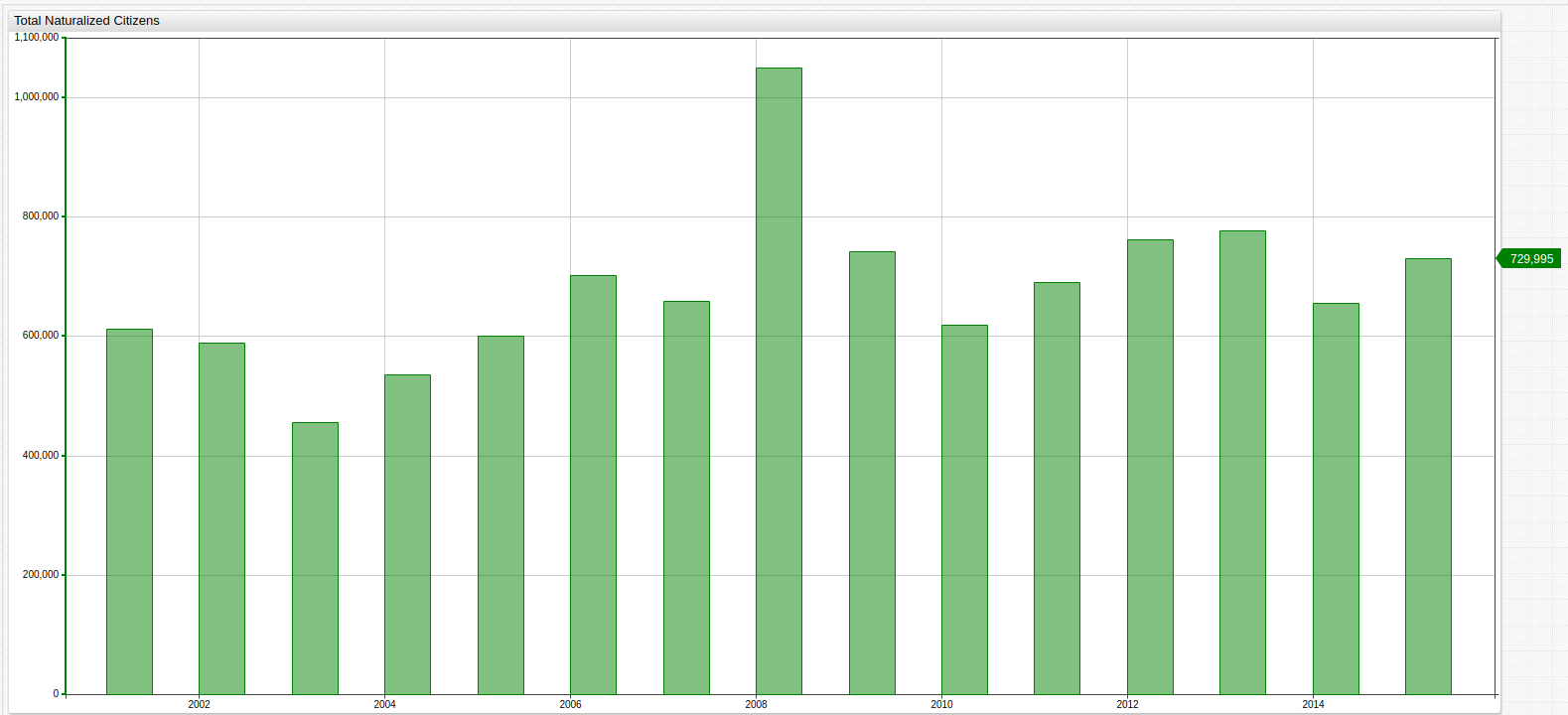
SELECT date_format(time,'yyyy') AS "Year", value AS "Naturalizations"
FROM Naturalized.Citizens
Data queried in the SQL Console.
| Year | Naturalizations |
|------|------------------|
| 2001 | 613,161 |
| 2002 | 589,727 |
| 2003 | 456,063 |
| 2004 | 536,176 |
| 2005 | 600,366 |
| 2006 | 702,663 |
| 2007 | 659,233 |
| 2008 | 1,050,399 |
| 2009 | 741,982 |
| 2010 | 619,075 |
| 2011 | 690,705 |
| 2012 | 762,742 |
| 2013 | 777,416 |
| 2014 | 654,949 |
| 2015 | 729,995 |
To give the issue further context, the table and visualization above use the most current Naturalization data from the Department of Homeland Security data.
Naturalization is the sister process to expatriation, because as a person expatriates from one country they must be naturalized in another or end up a stateless person.
Naturalization numbers in America have remained fairly constant throughout the last decade because there are a number of federal regulations that control the amount of long-term immigrants that America accepts each year and that quota is met without fail. As noted in the our Q1 article, the sister value and subject of this examination, expatriation numbers, has been steadily growing for several consecutive years.
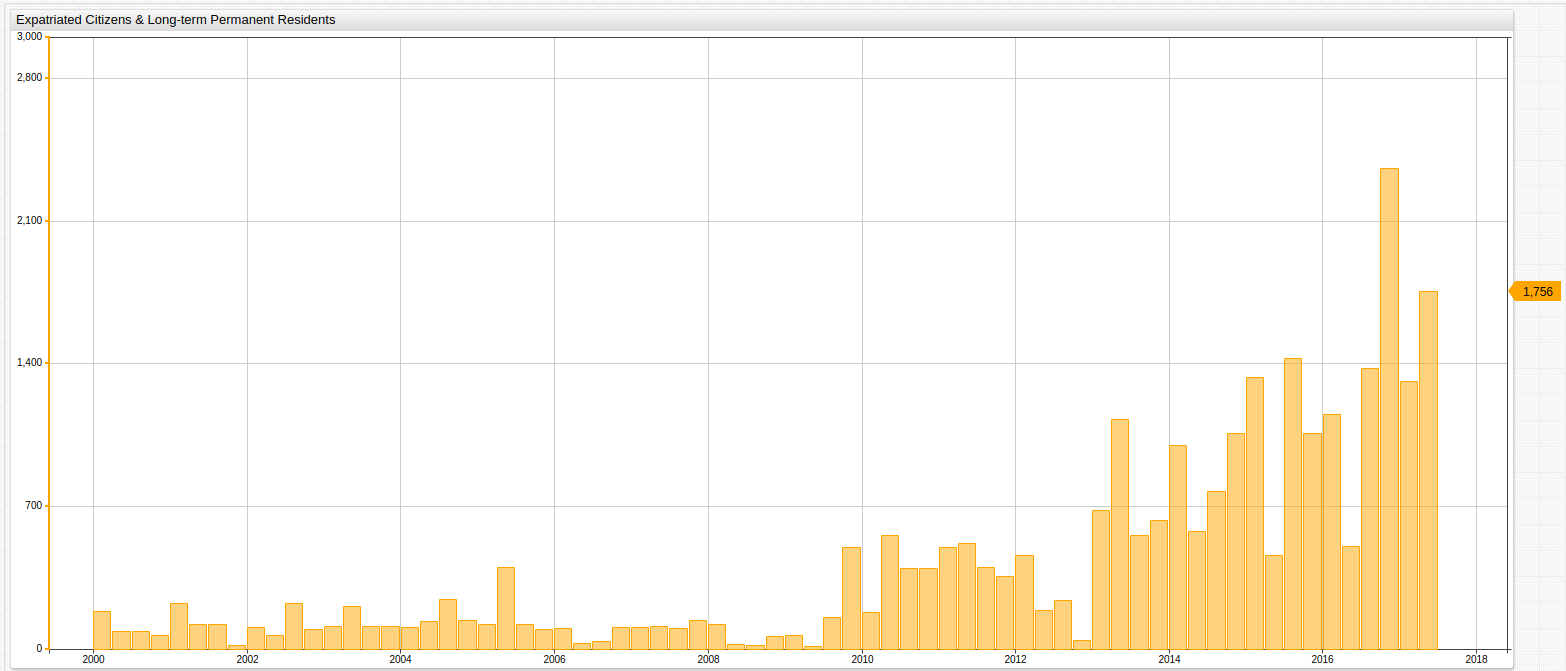
SELECT date_format(time+365*24*60*60000, 'yyyy') AS "Year",
count(value) AS "Year Total",
count(value)-lag(count(value)) AS "Y-o-Y Change",
100*(count(value)-lag(count(value)))/lag(count(value)) AS "Y-o-Y Change, %"
FROM "us-expatriate-counter"
WHERE entity = 'us.irs' AND datetime <= '2017-06-30T00:00:00Z'
GROUP BY period(1 YEAR, END_TIME)
ORDER BY period(1 YEAR, END_TIME)
The above query features syntax and calculated values. See the SQL Documentation for syntax examples.
| Year | Year Total | Y-o-Y Change | Y-o-Y Change, % |
|------|------------|--------------|-----------------|
| 2000 | 273 | null | null |
| 2001 | 502 | 229 | 84 |
| 2002 | 322 | -180 | -36 |
| 2003 | 646 | 324 | 101 |
| 2004 | 474 | -172 | -27 |
| 2005 | 911 | 437 | 92 |
| 2006 | 351 | -560 | -61 |
| 2007 | 368 | 17 | 5 |
| 2008 | 394 | 26 | 7 |
| 2009 | 166 | -228 | -58 |
| 2010 | 1395 | 1229 | 740 |
| 2011 | 1812 | 417 | 30 |
| 2012 | 1412 | -400 | -22 |
| 2013 | 2091 | 679 | 48 |
| 2014 | 2766 | 675 | 32 |
| 2015 | 3626 | 860 | 31 |
| 2016 | 4143 | 517 | 14 |
| 2017 | 6807 | 2664 | 64 |
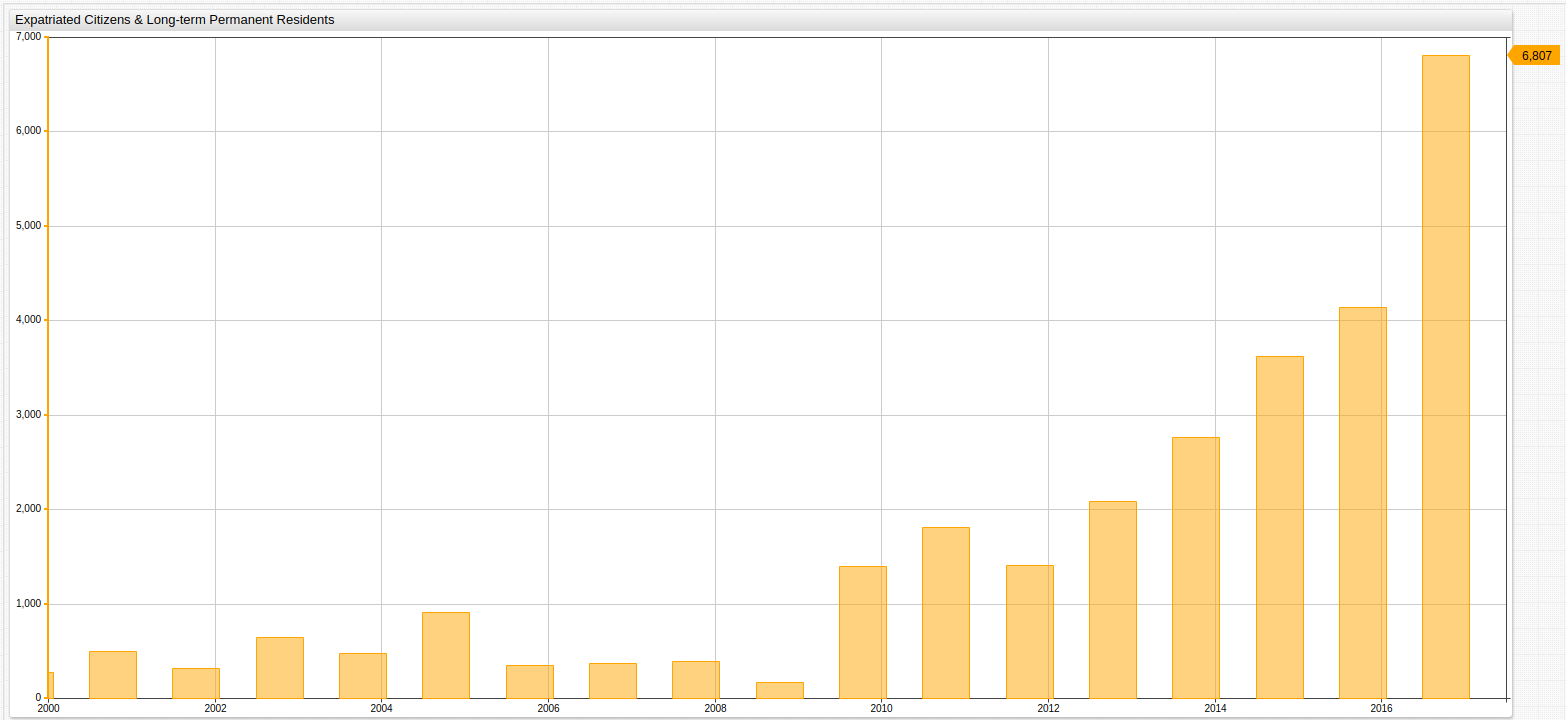
Expatriation has been increasing each year by roughly 30% since 2010, which featured abnormally high expatriation rates, most likely attributable to the economic turndown of the Great Recession which began in the United States as a result of the sub-prime mortgage crisis. American citizenship is often sought after for the economic opportunity that comes along with the passport, as the ability to work and do business in the country is heavily restricted or regulated, and with the value of that investment or opportunity in question, it is unsurprising that the number of investors in the system, that is, new citizens, would fluctuate. It seems appropriate to call naturalization an investment because of the nature of the process, which is long, complicated, and often quite expensive similar to a long-position that costs more at purchasing time but promises high returns after reaching maturity.
The peak, or more appropriately, valley of the global recession occurred in 2009 when the global GDP contracted causing a decline in the median family income of about five percent.
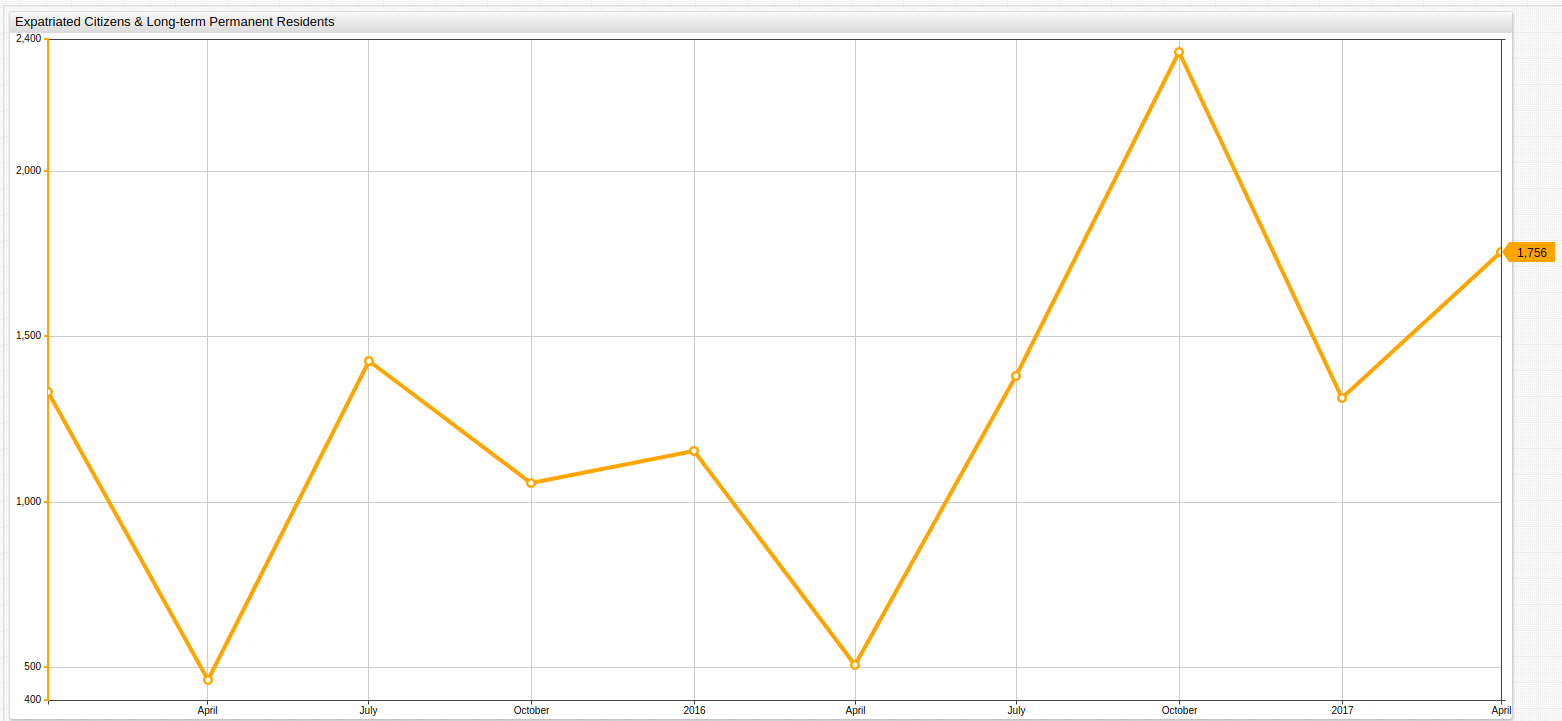
SELECT CEIL(CAST(date_format(time, 'M') AS NUMBER)/3) AS "Quarter", date_format(time, 'yyyy') AS "Year",
count(value) AS "Quarter Total"
FROM "us-expatriate-counter"
WHERE entity = 'us.irs' AND date_format(time, 'yyyy-MM') >= '2013-01' AND datetime <= now
GROUP BY period(1 QUARTER)
ORDER BY period(1 QUARTER)
| Quarter | Year | Quarter Total |
|---|---|---|
| 1 | 2013 | 679 |
| 2 | 2013 | 1129 |
| 3 | 2013 | 560 |
| 4 | 2013 | 631 |
| 1 | 2014 | 999 |
| 2 | 2014 | 576 |
| 3 | 2014 | 775 |
| 4 | 2014 | 1061 |
| 1 | 2015 | 1331 |
| 2 | 2015 | 459 |
| 3 | 2015 | 1426 |
| 4 | 2015 | 1057 |
| 1 | 2016 | 1154 |
| 2 | 2016 | 506 |
| 3 | 2016 | 1379 |
| 4 | 2016 | 2359 |
| 1 | 2017 | 1313 |
| 2 | 2017 | 1756 |
Reducing the timespan to look at data over the last 5 years captures the repetition of this trend for this period of time. Of the eighteen quarters included in this query, only six of them, roughly 33% showed negative growth for this statistic.
Conclusion
Growing expatriation numbers provide interesting insight into the perception of America both domestically and abroad, as these numbers not only include U.S. citizens who renounce their citizenship, but also long-term resident aliens who have returned home.
Almost unbelievably, the IRS does not strip characteristic information about expatriates from their publications meaning that first and last names are included in the data. Using Social Security data concerning the most common first names chosen throughout the last century and United States Census data concerning the most common last names to compare, the following queries and visualizations show the number of expatriates by common first and common last name throughout the entire observed period, ranked by their frequency in the IRS publication.
The goal of these queries is purely demonstrative and lighthearted. There is no intention to invade privacy, defame people, or otherwise cause harm.
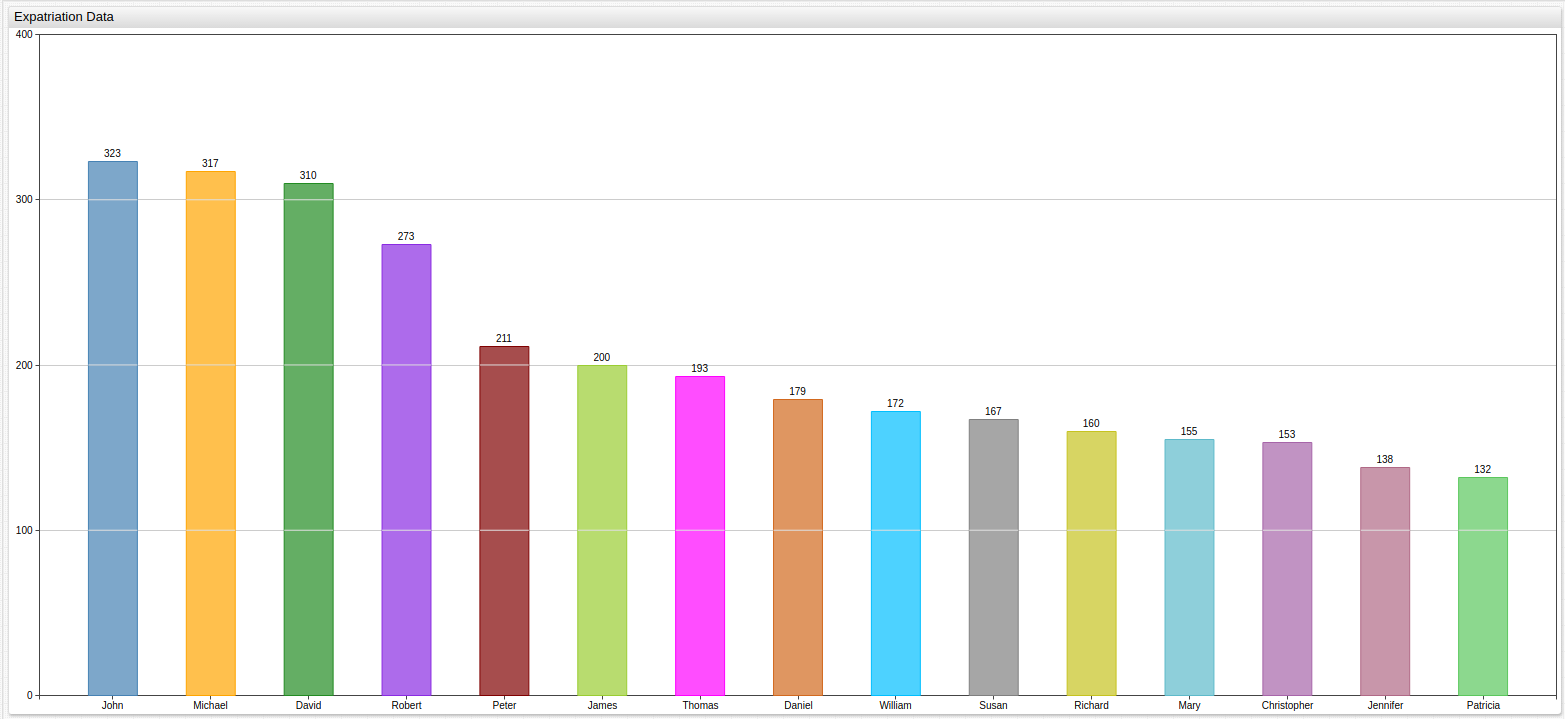
SELECT tags.first_name AS "First Name",
count(value) AS "Expat Total"
FROM "us-expatriate-counter"
WHERE entity = 'us.irs' AND datetime <= now
GROUP BY tags.first_name
ORDER BY count(value) desc
LIMIT 15
| First Name | Expat Total |
|-------------|-------------|
| JOHN | 323 |
| MICHAEL | 317 |
| DAVID | 310 |
| ROBERT | 273 |
| PETER | 211 |
| JAMES | 200 |
| THOMAS | 193 |
| DANIEL | 179 |
| WILLIAM | 172 |
| SUSAN | 167 |
| RICHARD | 160 |
| MARY | 155 |
| CHRISTOPHER | 153 |
| JENNIFER | 138 |
| PATRICIA | 132 |
All of these names appear on the list of most common American first names, linked here
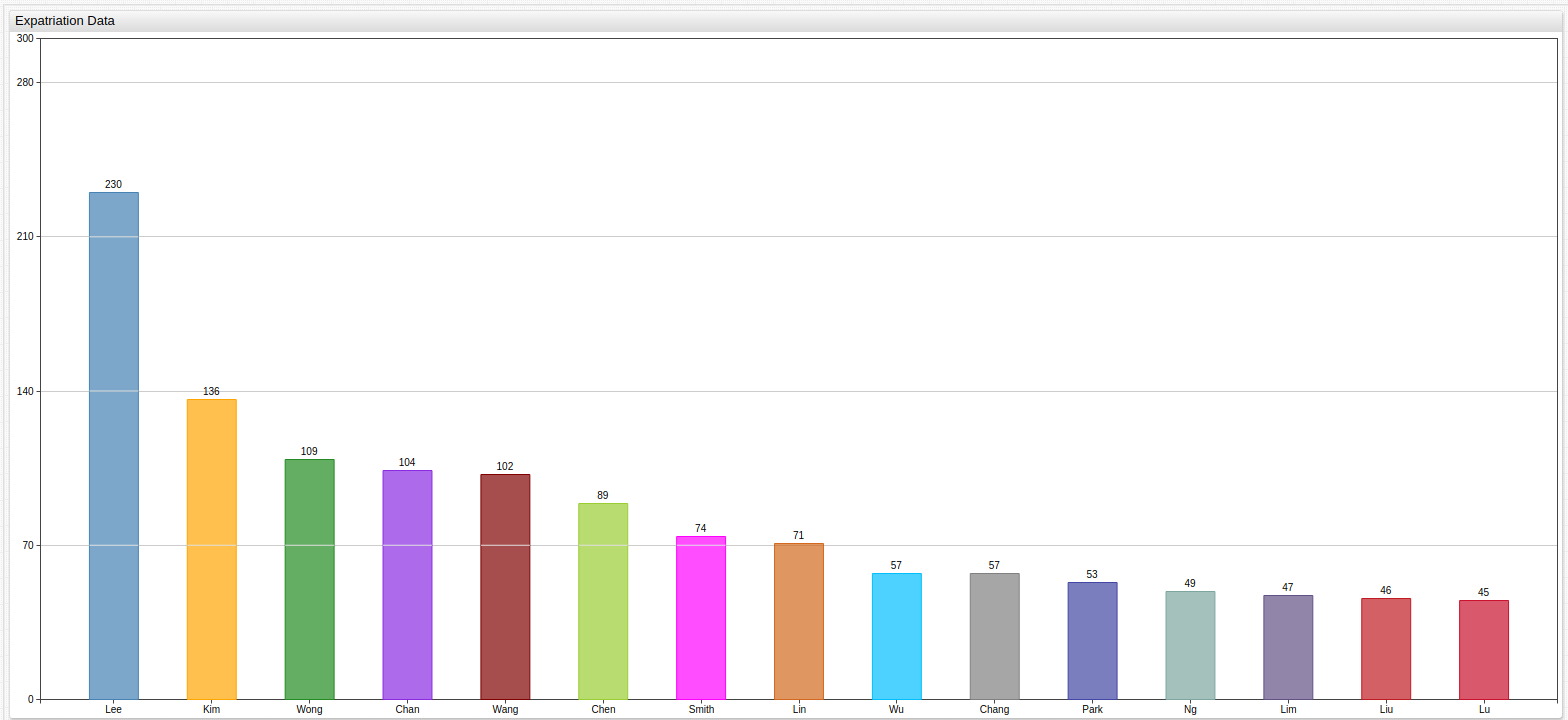
SELECT tags.last_name AS "Last Name",
count(value) AS "Expat Total"
FROM "us-expatriate-counter"
WHERE entity = 'us.irs' AND datetime <= now
GROUP BY tags.last_name
ORDER BY count(value) desc
LIMIT 15
| Last Name | Expat Total |
|---|---|
| LEE | 230 |
| KIM | 136 |
| WONG | 109 |
| CHAN | 104 |
| WANG | 102 |
| CHEN | 89 |
| SMITH | 74 |
| LIN | 71 |
| WU | 57 |
| CHANG | 57 |
| PARK | 53 |
| NG | 49 |
| LIM | 47 |
| LIU | 46 |
| LI | 45 |
Only the name Smith appears on the list of most common American last names.
Use the Axibase Data Crawler to collect the data used in this article and examine it yourself in ChartLab.
